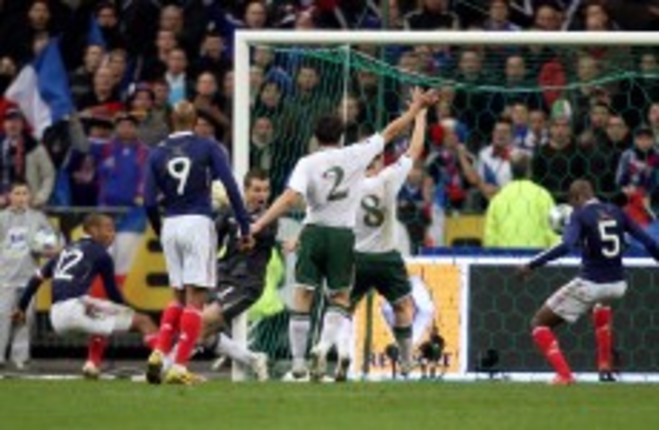THIERRY HENRY WON the World Cup with France but his legend will always be linked to Arsenal and a stellar career in the English Premier League.
Henry, who announced his retirement on Tuesday at the age of 37, leaves the football stage with a string of accolades.
On top of his 1998 World Cup and 2000 European Championship titles, Henry scored 51 goals in 123 appearances for France, more than a certain Michel Platini, won the Champions League with Barcelona and been hailed as one of the greatest players of his generation.
But it is a statue outside the Emirates Stadium in London that left Henry fighting back tears.
The 228 goals that he scored for Arsenal — out of 411 in his career — have made him the stuff of legend.
“I know some of the press used to kill me for not showing emotion — well, there you go, I am showing emotion for the club I love,” he said at an emotional ceremony to unveil the statue in 2011.
“Whatever I do, I do it with my heart, that is the way I am,” he said stood in front of the statue which depicts him on his knees, his fists clenched, at the end of a goalscoring celebration.
Henry was a pivotal member of Arsenal’s “Invincibles”, winning the Premier League twice and FA Cup three times. The statue is alongside one of Tony Adams, the club’s greatest captain, and Herbert Chapman, one of its greatest managers.
Henry repeatedly talks of his “love” for Arsenal and its fans. But the team’s failure to win the Champions League convinced him in 2007 that a move to Barcelona was needed. They won the trophy in 2009.
- Misunderstood -
Despite his international fame, Henry has never been understood, nor fully appreciated, in his home country.
Henry, whose parents come from Guadeloupe and Martinique, started his career at Monaco, moved briefly to Juventus and joined Arsenal for £11 million in August 1999.
The lack of emotion probably did not play in Henry’s favour in France. The fans are very demanding.
Henry also had to live in the shadow of Zinedine Zidane, who was twice voted world player of the year — a title his teammate never won.
Henry gained notoriety for his handball pass that enabled William Gallas to score the goal that narrowly got France through to the 2010 World Cup finals.
His time with the French national team ended at those finals in South Africa, clouded by the player strike that tore apart the team which left in shame after the first round.
The French coach of the time, Raymond Domenech, sympathised with Henry.
“When you compare the storm that he (Henry) had to endure and the near pardon that Zidane got after his headbutt, it is difficult to understand,” Domenech wrote in a memoir.
Henry remains one of the most elegant strikers of his time, who would appear from nowhere for a shot that many top class goalkeepers could not control.
“He is one of the world’s best goalscorers. He is so smart in front of goal,” commented Germany’s World Cup legend Franz Beckenbauer.
“The best thing to do with Thierry Henry is to watch him play, not to talk about him,” Arsenal coach Arsene Wenger once said of his former lynchpin player.
Henry will now extend his career as a football pundit in England, where he will always be a symbol without equal. A return to Arsenal in some kind of managerial role is almost certain.
Thierry Henry factfile:
- Born on August, 17, 1977 in Les Ulis, a suburb south of Paris. His parents come from the French Caribbean islands of Guadeloupe and Martinique. After being recruited by Monaco — then coached by future Arsenal manager Arsene Wenger — as a 13-year-old, Henry made his professional debut in August 1994 and two years later was named French Young Footballer of the Year.
- Won the first of his 123 caps in June 1997 and the following year played at the 1998 World Cup, where he was France’s top scorer with three goals, although he was on the bench for the hosts’ 3-0 victory over Brazil in the final. Scored three goals as France won Euro 2000 and netted a national record 51 goals during his international career. But he will also be remembered for a blatant handball in a 2009 World Cup qualifying play-off against the Republic of Ireland that led to the decisive goal for France and a ticket to the 2010 finals.
- Left Monaco in January 1999 for Italian Serie A club Juventus in a £10.5 million ($16.5 million, 13.2 million euros) transfer, but after failing to settle in Turin, moved to Arsenal in August that year for around £11 million. Went on to score a club-record 228 goals for Arsenal, including 175 in the English Premier League, and won two Premier Leagues and three FA Cups during his eight years at the club.
- Joined Barcelona in 2007 for £16.1 million and two years later won the league, cup and Champions League treble. Joined Major League Soccer side New York Red Bulls in 2010, briefly returning to Arsenal on loan in 2012 and scoring twice, including a late winner against Leeds United in the third round of the FA Cup.
- Set to join Sky Sports as a television analyst in January 2015, but Henry, whose daughter is based in England, has not ruled out a return to the club in some capacity in the future. “I’m obsessed by the idea of making my mark on history,” he said. “And Arsenal is my paradise.”

